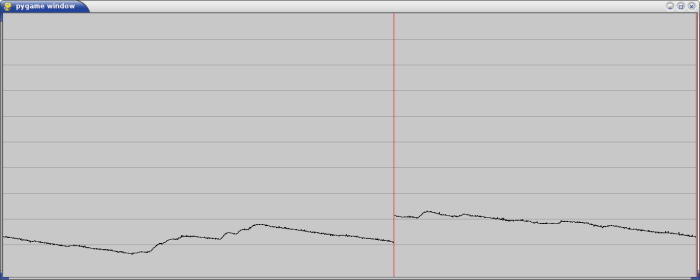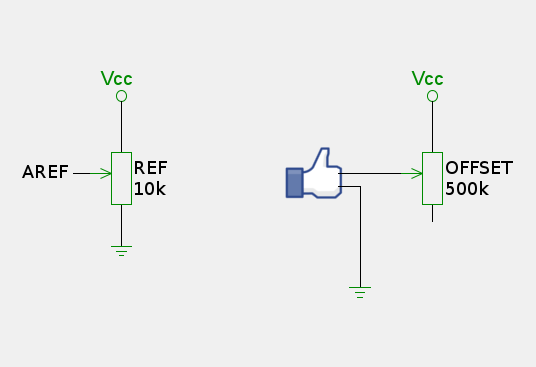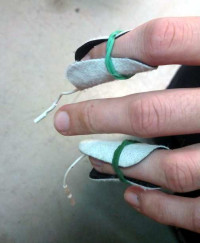Arduino GSR
Galvanic skin response with only two external parts.
Schematics
Adjustable current (~5μA) is passed through the subject and the voltage drop is read with AtMega ADC (as we have not found any other ADC). The ADC reference level is set by the second potentiometer.
Adding capacitors to AREF and ADC (A0) improves stability. We recommend something like 47 μF to AREF and 2.2 μF to ADC.
Electrodes
Electrodes are placed on two fingers of the same hand.
Using pieces of PCB (or other metal) as electrodes is really prone to motion and galvanic artifacts. Using 4x4cm TENS gel electrodes gives clean signal with no motion artifacts. The electrode is rolled around the finger and secured by rubber band.
Usage
- Set OFFSET to maximum resistance
- Connect electrodes
- Adjust REF to get the signal approximately to the middle of the scope
- If this is impossible or the signal is very noisy, decrease resistance of REF
Source
int sensorPin = A0; int sensorValue = 0; void setup() { Serial.begin(9600); analogReference(EXTERNAL); } void loop() { sensorValue = analogRead(sensorPin); Serial.println(sensorValue,DEC); delay(100); }
#!/usr/bin/python3 import pygame import random import time import serial import sys SCREENSIZE = XSIZE, YSIZE = (1350, 514) screen = pygame.display.set_mode(SCREENSIZE) x = 4 # background color bg = (200,200,200) # line color fg = (0,0,0) screen.fill(bg) ser = serial.Serial(port="/dev/ttyUSB0", baudrate=9600, timeout=1) yprev=0 # grid color gc = (150, 150, 150) def grid(x): ''' Draw horizontal grid ''' for i in range(1,500,50): pygame.draw.line(screen, gc, (x, i), (x,i)) from datetime import datetime from time import gmtime, strftime wow=datetime.now().strftime("%Y-%m-%d-%H%M%S") l=open("./gsr-%s.txt"%(wow), "a") while True: line = ser.readline() sys.stdout.write(line.decode("utf-8")) l.write(line.decode("utf-8")) x = (x+1)%(XSIZE-2) try: y = int(line)/2 except: y=0 # remove previous data pygame.draw.line(screen, bg, (x, 0), (x,YSIZE)) # draw red line pygame.draw.line(screen, (255,0,0), (x+1, 0), (x+1,YSIZE)) # draw grid grid(x) # draw data pygame.draw.line(screen, fg, (x, y), (x,yprev)) yprev=y pygame.display.update()


